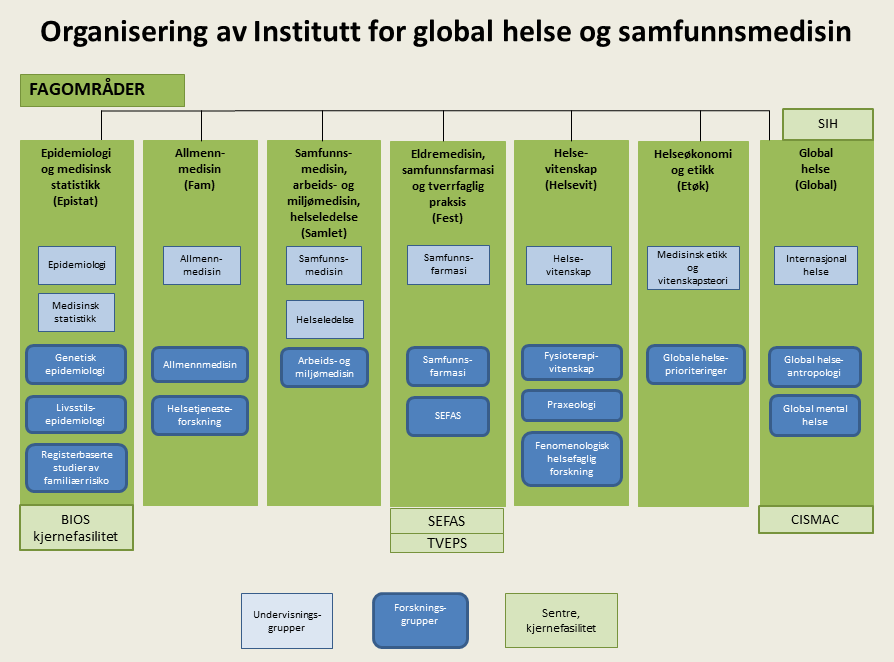UiB leadership meets with IGS strategic leaders
UiB Rector, Dag Rune Olsen, and Vice-Rector for Global Relations, Anneline Eriksen, met with IGS’ strategic research and education leaders Wednesday 2 October.

Hovedinnhold
The Rector and Vice-Rector are touring a number of Departments at the Medical Faculty. Head of Department, Guri Rørtveit hosted the meeting.
Welcome and brief presentation of IGS
Medical research at IGS has a long and valuable history. The Department has recently been re-organised into thematic areas. These areas include both research and education groups.
IGS briefly:
- Around 200 employees (not all full-time)
- 365 publications in 2018, including 88 level 2 publications
- 157 PhDs, 21 Defences in 2018
- 46 completed Masters in 2018
- Total budget of 139 million (63 million external funding)
- 49 million redistributed funds (not included in budget, but IGS are accountable for)
- 5 Centres: CIH, CISMAC (CoE), SEFAS, TVEPS, BCEPS
- 1 Core Facility (BIOS)
- CoE, ERC, Infrastructures
- Upcoming: IGS researchers are involved in a number of large applications including SFI, SFF and national infrastructures.
- Strategic work: research strategy (new plan to come for 2020-2023), education strategy
- New Master studies, new medical programme
The Rector alluded to a recent article in the Norwegian newspaper, Dagbladet, which mentioned the time press many researchers experience between writing funding applications and actually conducting research. He asked if this was an issue at IGS. Rørtveit responded that determining this balance is challenging, and that IGS is introducing seminars for sharing information, experience, and best practice between researchers.
Next autumn, IGS will move into Alrek, UiB’s new Health Cluster. This move will facilitate greater interdisciplinary work between groups and Faculties at UiB and beyond, in the Bergen Region. TVEPS is an example of an interdisciplinary education programme that many of the Alrek partners already are involved in. Ane Johannessen, Associate Professor and Head of TVEPS says that by Autumn 2020, 900-1000 students will be involved in the Centre’s workplace learning placements.
45 million to empowering girls in Zambia
Ingvild Sandøy leads RISE, a large CISMAC project in Zambia. The project follows 7th grade girls through 3 years of junior high school, which is a time when they are most vulnerable for dropping out of school and marrying early. The project started in 2016, and at the completion of data collection summer 2019, those involved had achieved an impressive high rate of follow-up – 93%. The researchers are now conducting analyses of the data collected from nearly 5000 girls from over 150 schools. Read more in Norwegian.
Researching the long-term effects of pregnancy on women’s health
Spring 2019, Rolv Skjærven was awarded an EU ERC Advance Grant. Skjærven uses data from Norway’s Birth Registry to study the long-term implications of a woman’s reproductive experience on her future development of chronic disease and death. He underlines the unique value of this Registry in a global context – it is both the oldest, and its information gives data relating to parity (how previous pregnancies can effect later health).
Workplacements in general practice a win-win
Gunnar Bondevik briefly presented the experience that Section for General Practice has with their medical student work placements, increased from 4 to 6 weeks with the new curriculum for the School of Medicine. Currently there are 79 location from across the Vestland Municipality involved in hosting 1-4 students in a 6-week work placement period. In addition to the placement in GP offices, the students also visit emergency centres, health stations, mid-wife centres, home-visit services, nursing homes or physiotherapy centres. The result of the student evaluations of the experience was that over 90% rated it as good or very good. Their hosts / supervisors also reported that the advantages of having a link to UiB’s academic environment gave benefits that outweighed the possible challenges of accommodating students.
Be wise – prioritize!
Ingrid Miljeteig presented those present with the challenge many low-income countries face: what health services does one prioritize, when the budget is 29$US per person per year (Norway’s budget is for over 7000$US per person per year)? How does one weigh cost-effectiveness, equality, justice, avoidance of catastrophic health costs …? How does one implement result-based decision making? The Ethics and health economy thematic area, and Global Health Priorities research group are host to a new centre, BCEPS, Bergen Centre for Ethics and Priority Setting, established with 121 million from several granting agencies and UiB. Their work is multi-disciplinary. An important aspect involves “training the trainers” in health priority methodologies, tools, visualisations etc. This competence-building is currently focusing primarily on three countries, Ethiopia, Zanzibar, and Malawi. They have many external collaborators – Miljeteig says there are around 140 people associated with them now. Follow their activity on @growingbceps @GHPriorities
Rector’s concluding remarks
- Olsen underlined that it is important for the university’s strategy building that UiB’s leadership come around to talk with people.
- He noted the significant funding gap between that reported in the Department budget, and that the Department actually was responsible and accountable for in the projects they coordinate, involving redistributing funds to other institutions.
- He was impressed with the strong links between the research and funding activity at IGS.
- He also recognised that much of IGS’ activity supports UiB’s main strategic focus areas including sustainability, knowledge sharing, and addressing global challenges.
